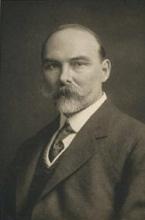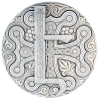The G. R. S. Mead Collection
http://www.gnosis.org/library/grs-mead/mead_index.htm
GEORGE ROBERT STOW MEAD (1863-1933) was born at Nuneaton, Warwickshire, England. He came from a military family—his father was a Colonel in the Royal Army Ordinance Corps—but he chose to follow an academic career instead. From King’s School, Rochester, he went up to St. John’s College, Cambridge, to study mathematics but changed to Classics, in which he graduated with a B.A. degree in 1884. In that same year, he joined the Theosophical Society and determined to devote his life to the cause of Theosophy.
During his vacations, Mead worked as a volunteer at the London headquarters of the Theosophical Society, and on one of his visits, in May 1887, he first met H. P. Blavatsky. He was at once captivated, and two years later H.P.B. repaid his devotion by giving him her absolute trust and appointing him her private secretary. In addition to handling H.P.B.’s correspondence, Mead also edited most of her later published works and acted, without acknowledgment, as assistant editor of her magazine, Lucifer, for which he had written anonymously since the first volume.
While working closely with the Theosophical Society, Mead also published many of his own works: The World Mystery (1895), Plotinus (1895), Orpheus (1896), and Pistis Sophia (1896). After over a century, his edition of Pistis Sophia remains one of the best translations and commentary available on this important Gnostic text. Not long after, Mead published two more major works, Fragments of a Faith Forgotten (1900) and Thrice Greatest Hermes (1906). Both exemplify all that is best in his dedicated, scholarly, but eminently readable studies of the spiritual roots of Christian Gnosticism and, more generally, of personal religion in the Greco-Roman world. But his work encompassed much more than this, Mead was equally at home with Sanskrit texts, Patristic literature, Buddhist thought, and the problems of contemporary philosophy and psychical research. He devoted his intellectual energy to the complex interplay of Gnosticism, Hellenism, Judaism, and Christianity.
In 1906 Mead also began publication of a series of monographs under the title Echoes from the Gnosis (recently republished in a centennial edition) summarizing his insights into the formation of the Gnostic world-view. By this time Mead had published eight works on various aspects of the early Christian world and on “The Theosophy of the Greeks.” Together with his outstanding translations of the Hermetic books, these works established his reputation as one of the foremost English scholars in his broadly chosen fields. Mead was the first modern scholar of Gnostic tradition. A century later, the corpus of his work remains unequaled in breadth and insight.
Resources and commentary compiled by Lance S. Owens
Thrice-Greatest Hermes
by G. R. S. Mead
*
1906
Volume 1
Title Page
Preface
Contents
Poem
I. The Remains of the Trismegistic Literature
II. The History of the Evolution of Opinion
III. Thoth the Master of Wisdom
IV. The Popular Theurgic Hermes-Cult in the Greek Magic Papyri
V. The Main Source of the Trismegistic Literature According to Manetho, High Priest of Egypt
VI. An Egyptian Prototype of the Main Features of the Pœmandres’ Cosmogony
VII. The Myth of Man in the Mysteries
VIII. Philo of Alexandria and the Hellenistic Theology
IX. Plutarch: Concerning the Mysteries of Isis and Osiris
Foreword
Address to Klea concerning Gnosis and the Search for Truth
The Art of Knowing and of Divinising
The True Initiates of Isis
Why the Priests are Shaven and wear Linen
Of the Refraining from Flesh and Salt and Superfluities
On the Drinking of Wine
On Fish Taboos
The Onion and Pig Taboos
The Kings, the Riddles of the Priests, and the Meaning of Amoun
Of the Greek Disciples of Egyptians and of Pythagoras and his Symbols
Advice to Klea concerning the Hidden Meaning of the Myths
The Mystery-Myth
The Undermeaning a Reflexion of a Certain Reason
Concerning the Tombs of Osiris
Concerning the Theory of Evemerus
The Theory of the Daimones
Concerning Sarapis
Concerning Typhon
The Theory of the Physicists
Concerning Osiris and Dionysus
The Theory of the Physicists Resumed
The Theory of the Mathematici
The Theory of the Dualists
The Proper Reason according to Plutarch
The Symbolism of the Sistrum
The True “Logos,” again, according to Plutarch
Against the Weather and Vegetation God Theories
Concerning the Worship of Animals, and Totemism
Concerning the Sacred Robes
Concerning Incense
Afterword
X. ‘Hermas’ and ‘Hermes’
XI. Concerning the Æon-Doctrine
XII. The Seven Zones and their Characteristics
XIII. Plato: Concerning Metempsychosis
XIV. The Vision of Er
XV. Concerning the Crater or Cup
XVI. The Disciples of Thrice-Greatest Hermes
Volume 2
I. Corpus Hermeticum
I. Pœmandres, the Shepherd of Men
Commentary
(II.) The General Sermon
II. (III.) To Asclepius
Commentary
III. (IV.) The Sacred Sermon
Commentary
IV. (V.) The Cup or Monad
Commentary
V. (VI.) Though Unmanifest God is Most Manifest
Commentary
VI. (VII.) In God Alone is Good and Elsewhere Nowhere
Commentary
VII. (VIII.) The Greatest Ill Among Men is Ignorance of God
Commentary
VIII. (IX.) That No One of Existing Things doth Perish, but Men in Error Speak of Their Changes as Destructions and as Deaths
Commentary
IX. (X.) On Thought and Sense
Commentary
X. (XI.) The Key
Commentary
XI. (XII.) Mind Unto Hermes
Commentary
XII. (XIII.) About the Common Mind
Commentary
XIII. (XIV.) The Secret Sermon on the Mountain
Commentary
XIV. (XV.) A Letter to Asclepius
Commentary
(XVI.) The Definitions of Asclepius unto King Ammon
Commentary
(XVII.) Of Asclepius to the King
Commentary
(XVIII.) The Encomium of Kings
Commentary
II. The Perfect Sermon; or the Asclepius
Part I
Part II
Part III
Part IV
Part V
Part VI
Part VII
Part VIII
Part IX
Part X
Part XI
Part XII
Part XIII
Part XIV
Part XV
Commentary
Volume 3
I. Excerpts by Stobæus
Excerpt I. Of Piety and True Philosophy
Excerpt II. Of the Ineffability of God
Excerpt III. Of Truth
Excerpt IV. God, Nature and the Gods
Excerpt V. Of Matter
Excerpt VI. Of Time
Excerpt VII. Of Bodies Everlasting and Bodies Perishable
Excerpt VIII. Of Energy and Feeling
Excerpt IX. Of the Decans and the Stars
Excerpt X. Concerning the Rule of Providence, Necessity and Fate
Excerpt XI. Of Justice
Excerpt XII. Of Providence and Fate
Excerpt XIII. Of the Whole Economy
Excerpt XIV. Of Soul, I.
Excerpt XV. Of Soul, II.
Excerpt XVI. Of Soul, III.
Excerpt XVII. Of Soul, IV.
Excerpt XVIII. Of Soul, V.
Excerpt XIX. Of Soul, VI.
Excerpt XX. The Power of Choice
Excerpt XXI. Of Isis to Horus
Excerpt XXII. An Apophthegm
Excerpt XXIII. From “Aphrodite”
Excerpt XXIV. A Hymn of the Gods
Excerpt XXV. The Virgin of the World, I.
Excerpt XXVI. The Virgin of the World, II.
Commentary
Excerpt XXVII. From the Sermon of Isis to Horus
Commentary
II. References and Fragments in the Fathers
I. Justin Martyr
II. Athenagoras
III. Clement of Alexandria
IV. Tertullian
V. Cyprian
VI. Arnobius
VII. Lactantius
VIII. Augustine
IX. Cyril of Alexandria
X. Suidas
XI. Anonymous
III. References and Fragments in the Philosophers
I. Zosimus
II. Jamblichus
III. Julian the Emperor
IV. Fulgentius the Mythographer
IV. Conclusion
Index
Works by G. R. S. Mead

